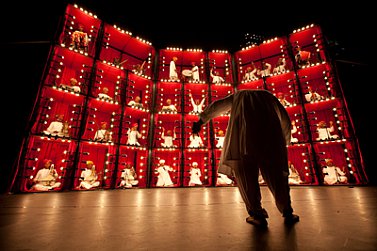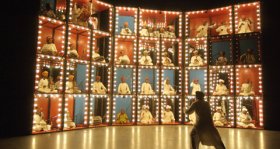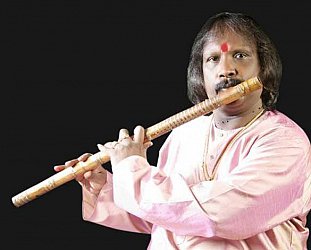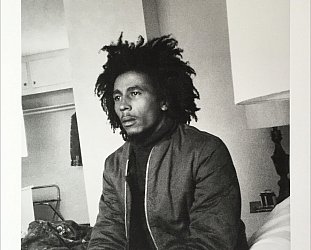Graham Reid | | 4 min read

Inspiration doesn't always come in the
proverbial flash. It may emerge over a period from a number of
disparate sources, as it did for Roysten Abel and his theatrical
staging of The Manganiyar Seduction.
The 43 performers from a caste of
Rajasthani musicians from Northern India are housed in four tiers of
36 separately illuminated cubicles. They sing and play a contemporary
extension of their own Hindu, Islamic and Sufi music which has
developed over many generations.
Their profoundly emotional and dramatic
music has been brought into the contemporary world by Abel who first
encountered two Manganiyar singers when he took them on the road in
Europe as part of traveling show of unemployed street performers
which also included acrobats, jugglers, snake charmers and musicians.
“They would follow me and sing at any
given point in time, waking me in the morning or putting me to sleep,
almost like 15 hours of intense singing I was subjected to,” laughs
Abel.
“But it was more than welcome because
I was so inspired and seduced, and it was not just a psychological
experience but a physiological one.
“When something is supposed to happen
it just follows you and makes it happen. It was an overwhelming
experience I felt for those two weeks so I wanted to translate that
experience into theatre.”
When the musicians are illuminated in
The Manganiyar Seduction – which has three performances at
the forthcoming Auckland Art Festival – the effect is one of a
glittering jewel box, which was one source of his inspiration. And
another was . . . the red light district of Amsterdam?
“Yes, that's true, but only part of
it. The first thing I was looking at was how to take this into a
physical space and I thought of what that experience had done for me,
it seduce my soul. So I was looking for parallels of seduction and
one that came to mind was the red light district of Amsterdam where I
had gone for the first time about 12 years ago.
“I went there by mistake but it was
absolutely stunning with the floors of windows [in which prostitutes
sit and try to seduce clients].
“I had never seen anything like that
in my life and I found that burlesque experience very theatrical. So
I thought that could be a starting point – and when the Manganiyars
sang I experienced a more beautiful side of myself, so it was like a
mirror.
“So I created what looked like
theatre make-up mirror with lights on all four sides. And what are
these musicians? They are like gems of India. So it is a combination
of all these different things.”
After the European tour Abel returned
to India, went to Rajasthan and auditioned around 500 musicians,
whittled the number down to 36, then tried an experiment with 20
minutes of music. The players were not used to coming in on cue or
even rehearsals, and they were being required to take a seven or
eight minute traditional piece and stretch it out and “I arranged
like the emotions in a play”.
Over time – a year and half between
auditions and first serious performance – a trust built between the
Manganiyars and this conductor/director who was from Kerala in the
south.
 “They knew what this man, even though
he was from outside, was trying to do and so I was okay. And I needed
to understand them and let them sink into this world, and me into
theirs.”
“They knew what this man, even though
he was from outside, was trying to do and so I was okay. And I needed
to understand them and let them sink into this world, and me into
theirs.”
The result has been a piece of musical
theatre which has been acclaimed in Europe, Australia and the United
States. Yet Abel – who travels with his production as lighting
director – came to this through a circuitous route.
He started off in Shakespeare which he
found easy at school, directed a production of Merchant of Venice
while at drama school and spent a year with the Royal Shakespeare
Company as an apprentice in 94 before returning to India where he
increasingly combined Shakespeare with new Indian writers, then
Indian song.
“I liked to look at classical Indian
songs which gave expression to Shakespeare's writing. My initial work
was pretty straight and placed them into an Indian setting and then
we got more culture specific, almost recontextualising Shakespeare.
If the source is specific it actually becomes universal.”
He also directed a feature film In
Othello in which boundaries blur between the play and the cast:
“The play flows into life and vice-versa and at the end you don't
know if Othello is killing Desdemona or the actor playing her.
“But I don't enjoy film. That was
just because someone came to me asked me to do it. I'm not passionate
about it the way I am about theatre, I find it too tedious, too
boring. Film happens in parts and you wait for it to come together
through a mechanical process.
“It is too mechanical a medium,
unlike theatre which is more organic – and where unexpected things
happen all the time.”
The Manganiyar Seduction,
The Civic Theatre, Thursday March 10 to Saturday March 12 2011, 7.30pm







post a comment